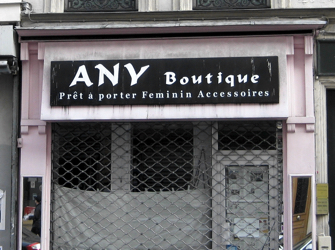
A note from David Jaggard: As France and much of the world endures a lockdown to slow the spread of Covid-19 coronavirus, I’m sure that many Paris Update readers are, like me, thinking back to a happier, more carefree time.
Ah, life was so pleasant back then. I could leave my apartment without having to prove that it was necessary! I could stay out as long as I wanted! I could buy hand sanitizer! And toilet paper! And, best of all, I could wander all over town looking for ridiculous uses of English in Parisian shop signs…
This article was originally posted on July 25, 2016.
I love to make grandiose, pompous predictions. Especially if they can never be proven false within my lifetime. Here’s one: I predict that the English language will evolve nearly beyond recognition within 269 years.
I picked that number because it’s half the amount of time that has expired since Chaucer published “The Canterbury Tales” (1478) in the nearly foreign-looking language now called Middle English, and I figure that exponential progress in global communication will at least double the speed of future linguistic evolution.
For better or worse (worse, according to me), English is on its way to becoming the world’s common language. The fact that so many non-native speakers use it — not to mention the influence of textspeak, the disappearance of copy editors and the sad fact that people who say “nucular” are allowed to have children — will unavoidably lead to extensive changes. At the very least, spelling and grammar will no doubt be greatly simplified.
This isn’t a complaint. Language change is a natural and perpetual process, and any attempt to prevent it would be about as successful as trying to stop teenagers from finding porn on the Internet.
So by 2285, this web page and everything within clicking distance will be as quaint-looking and semi-intelligible as ”Whan that Aprille with his shoures soote” seems to us now.
Thus, faced with the inevitable demise of my native tongue as I know it, I see only one sensible course of action: to make fun of as many ill-advised English shop signs as I can before it’s too late.
As explained in previous installments of this recurring feature (part 16 contains a link to part 15, which contains a link to part 14, which contains a link to part 13, and if you wonder what part 13 contains you’re probably pronouncing “nuclear” wrong), a lot of French businesses pick an English name in an attempt to look with-it and international. But they often end up looking out-of-it and irrational.
When it comes to choosing English trade names, the French are:
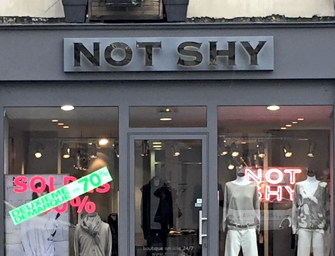
Some of the names they pick are rather, shall we say, uninspired:
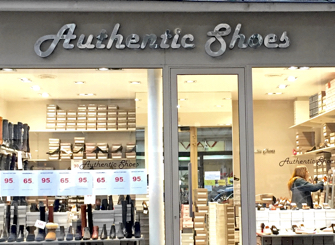
Some are meant to sound exotic, but don’t:

Some are meant to rhyme, but don’t:

Some are apparently meant to conjure up images of The Old Sod, but don’t:
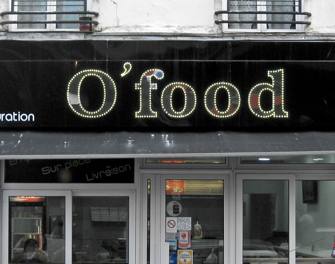
And some just make you wonder what the hell the owner was thinking:

Some business owners succumb to the temptation to make puns. Horrible, horrible puns:
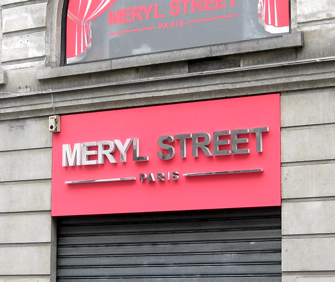
And many have a special fondness for juxtaposition. Any two English words, logic notwithstanding, can be mashed together in a French shop sign:
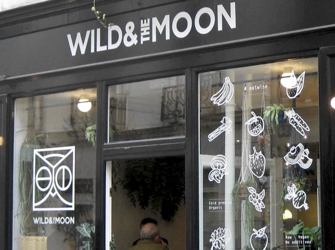

Like the previous example, some signs can’t seem to make up their minds which language they’re in:
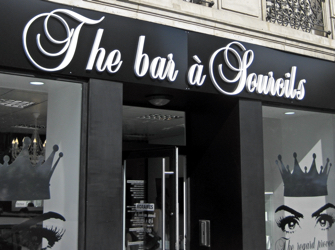
Some try (and more or less fail) to evoke contemporary buzzwords:
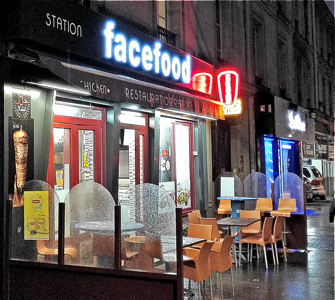
Some are frankly alarming:
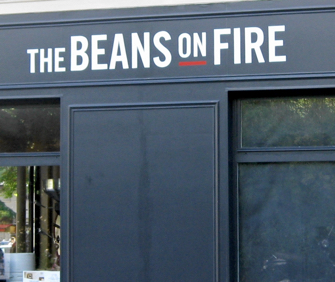
And some are just plain weird:

It is a matter of public record that I love living in Paris. There are many reasons for this, 15 of which appear in this article.
So when people ask me if I would ever move anywhere else, I give them a two-word reply. The first word is “move” and the second word is:

Readers who have time on their hands and can’t get enough dumb English signs can find all 22 installments of this regular feature here.
FavoriteAn album of David Jaggard’s comic compositions is now available for streaming on Spotify and Apple Music, for purchase (whole or track by track) on iTunes and Amazon, and on every other music downloading service in the known universe, under the title “Totally Unrelated.”
Note to readers: David Jaggard’s e-book Quorum of One: Satire 1998-2011 is available from Amazon as well as iTunes, iBookstore, Nook, Reader Store, Kobo, Copia and many other distributors.
